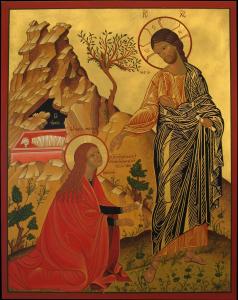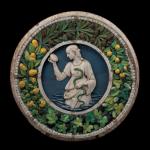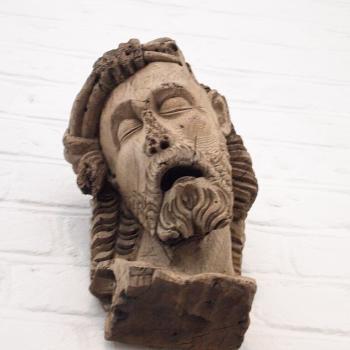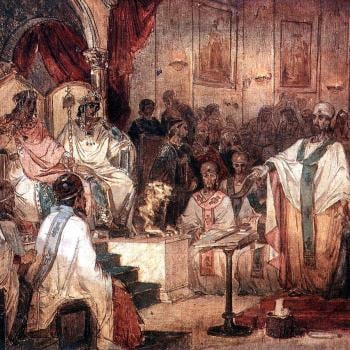
Some Christians like to use Paul to tell women that they have no right to speak in church (cf. 1 Cor. 14:34). They used his words out of context, absolutizing a literal interpretation of them instead of understanding the audience and reason why Paul told some women to be silent. If we accepted the interpretation which suggested women should be absolutely silent in church and have no authority to speak or teach others, we would have to conclude Paul was contradicting Jesus, for Jesus, far from silencing women, promoted their voice. After all, we find that St Mary Magdalene and the other myrrh bearing women were given a commission to preach about the risen Christ to the apostles:
And looking up, they saw that the stone was rolled back; — it was very large. And entering the tomb, they saw a young man sitting on the right side, dressed in a white robe; and they were amazed. And he said to them, “Do not be amazed; you seek Jesus of Nazareth, who was crucified. He has risen, he is not here; see the place where they laid him. But go, tell his disciples and Peter that he is going before you to Galilee; there you will see him, as he told you” (Mk. 16:4-7 RSV).
Mary and those with her were told that Jesus “has risen.” That is, Jesus himself rose from the dead. Jesus himself said that he was the one who had the power to give up his life and the power to take it back again (cf. Jn. 10:18). In other passages of Scripture, however, instead of being the subject who rose from the dead, we are told that God was the one who brought him back from the dead (cf. Rom. 6:10-11). And so, if we are to believe both that God raised Jesus from the dead and that Jesus himself is the one who had the power to take back his life and rise from the dead, then, we might conclude that Jesus himself is God. This certainly seems to be one of the ways early Christians came to that conclusion. And yet, by combing the two in this way, it almost seems to lose something in the equation, for we are told that God raised Jesus from the dead as a way to glorify him, even as it was also a way by which God affirmed the validity of Jesus and his message. Christian teaching has a way to affirm, that is, a way to affirm that in some sense, Jesus is the passive subject of God’s affirmation, while in another sense, Jesus was an active subject in regards the resurrection, and it does so through the teaching of the hypostatic union. Jesus is one person, a divine person, who assumed human nature. In his divinity, Jesus is one with the Father and the Holy Spirit, and active with them in regards the resurrection, but in his humanity, he is passive, and so in his humanity, he finds himself the recipient of the resurrection and the glorification which came from it. That is, in his humanity, he was passive; he gave himself up and over to those who would kill him, but also to God. And in this respect, his death, and what happened in and with it, all the way to the resurrection itself, can be said to serve as the completion of the incarnation, for it was the completion of the kenosis or self-emptying the Logos underwent to become man. And as he is one person, so what happens to his humanity happens to him in such a way that he can be said to be the passive subject of the resurrection.
Mary, and the other women with her, did not engage any theological reflection when they learned about the resurrected Christ. What they learned is that Christ had risen from the dead and that they were called to tell others, indeed, to preach to others, that Christ had risen from the dead. They were called to share with others the wonder and majesty of their experience. They were not told to theologize, just to preach: Christ, who once was dead, now lived again. Death no longer had any hold on him. All the dogmatic, theological reflection of what this meant would come later. We must remember such reflections represent human constructs used to understand the resurrection, and as such, must always be seen as secondary to the truth of the resurrection itself. Nonetheless, it is clear, it was difficult for them to tell others about their experience because it left them rather confused and astonished: “And they went out and fled from the tomb; for trembling and astonishment had come upon them; and they said nothing to any one, for they were afraid” (Mk. 16:8 RSV).
We know that eventually Mary Magdalene, and those with her, eventually did do as they were told. They preached to the apostles. Mary especially had a special place here; she was, as it were, their leader, making her the primary speaker, which is why she is given the title the apostle to the apostles, the one who was sent out and preached to the apostles. “Now it was Mary Magdalene and Joanna and Mary the mother of James and the other women with them who told this to the apostles; but these words seemed to them an idle tale, and they did not believe them” (Lk. 20:10-11 RSV).
Mary and the other women preached, as they had been told to do, but it seems that they were not believed. They were, for the most part, rejected by the apostles. They were ridiculed, treated as silly women who didn’t know any better. Only one, Peter, got a sense that they might not be so foolish, and so, after some time thinking and pondering, thought he had to investigate the tomb for himself (cf. Lk. 24:12). While he did not entirely believe them, he didn’t entirely discount them, showing how better he was than the rest of the apostles; and yet, he was still far from perfect. The apostles had to learn to accept the testimony of women, to trust them as they would other men. Certainly, the resurrection was beyond the ability of the apostles to understand, and so that explains why it would be difficult to accept, but by this point in time, they should have known these women, and known them well enough to trust them and believe that they had experienced something tremendous. While, certainly, they would have wanted to understand that experience, to know what it meant, they should have at least accepted the women’s account, believing that they didn’t make things up and that they were not crazy. The women should not have been so easily dismissed. Sadly, women throughout the centuries have had a similar experience. They have learned that when they say something people do not want to hear, or something which confuses others, they are not trusted or believed, even by those who know them and love them, that is, those who should know better than ignore what they have to say. Often, unlike Mary and the other myrrh bearing women, such women have not been given the chance to have their experience confirmed, causing great pain and sorrow to them. And thus, for the span of time before the apostles experienced the resurrection for themselves, Mary and the other myrrh bearing women truly experienced what women throughout history of experienced, the denial of what they had to say because they were treated as foolish and untrustworthy. And, even after their words were confirmed, Mary and the other women experienced another thing women have experienced, that is, having their agency taken away from them, for once the apostles experienced the resurrection for themselves, they found a way to sideline the women.
The apostles should have realized the women were chosen to preach. Indeed, in the economy of the resurrection, women were told to preach the truth of the resurrection first, and in this way, they should have been seen as the first among equals, for, like the apostles, they had been given a commission from Christ. The impact of this failure of the apostles to recognize the agency of women in the early church has affected Christianity ever since, for we see, ever since then, women have consistently found themselves sidelined in the church. Of course, throughout history, we find many great, saintly women, fighting back against this tendency, trying to reassert the proper equality of women in the Christian faith, such as we find in the example of St. Pulcheria, with others, like St. Hildegard, each of them finding creative ways to reassert the agency of women. But such women have not been normative. For the most part, only a few have been able to push beyond the barriers put on women, with the rest of the women, no matter how important their role in history actually was, find themselves sidelined like Mary and the myrrh bearing women. It is time we realize this has been a grave mistake. Women have always had an important role in the church. They have always worked hard preserving the faith, handing it down to their children. Many of them, like St. Macrina, stand behind many of the great theological revolutions in history. It is time we remember this, so that we can now help correct the mistakes of the past, realizing not only have women had a significant role in the development of Christian theology (and so an important role in Christian history), their voice should be promoted, so that the agency Christ recognized they had could and would finally be preserved, and in this way, making way for a new, improved future for Christianity (even as Christianity improved once it came to understand the evils of slavery must be rejected).
Stay in touch! Like A Little Bit of Nothing on Facebook.
If you liked what you read, please consider sharing it with your friends and family!
N.B.: While I read comments to moderate them, I rarely respond to them. If I don’t respond to your comment directly, don’t assume I am unthankful for it. I appreciate it. But I want readers to feel free to ask questions, and hopefully, dialogue with each other. I have shared what I wanted to say, though some responses will get a brief reply by me, or, if I find it interesting and something I can engage fully, as the foundation for another post. I have had many posts inspired or improved upon thanks to my readers.













